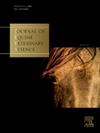Effect of heterologous blood plasma (HBP) on the freezing extender of equine sperm
IF 1.3
3区 农林科学
Q2 VETERINARY SCIENCES
引用次数: 0
Abstract
Sperm cryopreservation is essential for the conservation of genetic resources, but freezing can compromise its fertilizing capacity. Optimizing cryopreservation techniques is crucial for developing effective extenders. Platelet-rich plasma (PRP) is an innovative therapeutic approach, showing promising results. However, considering the difficulty of performing absolute platelet counts in the field, this study integrated heterologous blood plasma (HBP) into the cryopreservation extender for equine semen. The objective was to evaluate the efficacy of HBP, added to freezing extender, through analysis of sperm kinetic parameters, plasma membrane integrity (PMI), acrosomal membrane integrity (AMI), and mitochondrial membrane potential (MMP). The experiment was conducted at the Animal Andrology Laboratory of the Federal Rural University of Pernambuco, using five stallions (5 to 9 years old). Blood samples were collected in tubes containing 3.6% sodium citrate and subjected to centrifugation (100G/10 minutes). Supernatant was collected and centrifuged (1600G/20 minutes) and combined into a single tube and homogenized. Ejaculates were collected using an artificial vagina. For freezing, samples were diluted in BotucrioⓇ, supplemented with HBP (0%, 1%, 2%, and 5%), and frozen in an automated system (TK 3000Ⓡ). Statistical analyses were performed using GraphPad InStat software. No significant differences were observed in total motility parameter among the treated groups. However, the study revealed significant differences in lateral head amplitude (ALH) parameters, with the group treated with 5% HBP showing higher values than control group. Additionally, linearity (LIN) values were greater in the 1.25% and 5.0% groups compared to control group (P ≤ 0.05). Kinetic parameters such as LIN and WOB have been shown to have a high correlation with the progressivity of frozen-thawed sperm (Harris. et al. Reproduction. 2023). Conversely, the wobble index (WOB) demonstrated a significant increase compared to control group. Regarding acrosome membrane integrity (%), it was seen a positive effect of HBP in the groups with concentrations of 2.5% (65,12± 6.01) and 5% (65,64± 3.80) when compared to control group (61,44±7.17). These results can be attributed to the buffering effect of HBP, that prevents osmotic shock, decreasing the risk of crystallization during the cryopreservation process. It can be concluded that adding heterologous blood plasma to the freezing medium demonstrated satisfactory results in sperm kinetics, presenting linear sperm with an intact acrosome.
异源血浆(HBP)对马精子冷冻延长剂的影响
精子冷冻保存是保存遗传资源的必要条件,但冷冻会损害精子的受精能力。优化低温保存技术是开发有效扩展剂的关键。富血小板血浆(PRP)是一种创新的治疗方法,显示出良好的效果。然而,考虑到在现场进行绝对血小板计数的困难,本研究将异体血浆(HBP)纳入马精液冷冻保存扩展器中。目的是通过分析精子动力学参数、质膜完整性(PMI)、顶体膜完整性(AMI)和线粒体膜电位(MMP)来评价添加HBP到冷冻扩展剂中的效果。实验在伯南布哥联邦农村大学动物男科实验室进行,使用了五匹公马(5至9岁)。采集血样于含3.6%柠檬酸钠的试管中,离心(100G/10分钟)。收集上清液,离心(1600G/20分钟),合并成一管,均质。射精用人工阴道收集。冷冻时,样品在BotucrioⓇ中稀释,加入HBP(0%、1%、2%和5%),并在自动化系统(TK 3000Ⓡ)中冷冻。使用GraphPad InStat软件进行统计分析。治疗组间总运动参数无显著差异。然而,研究显示侧头振幅(ALH)参数有显著差异,5% HBP治疗组的数值高于对照组。此外,1.25%和5.0%组的线性(LIN)值高于对照组(P≤0.05)。动力学参数如LIN和WOB已被证明与冻融精子的进行性高度相关(Harris。et al。繁殖。2023)。相反,与对照组相比,摇摆指数(WOB)明显增加。在顶体膜完整性(%)方面,HBP浓度为2.5%(65,12±6.01)和5%(65,64±3.80)组较对照组(61,44±7.17)组有积极作用。这些结果可归因于HBP的缓冲作用,它可以防止渗透休克,降低低温保存过程中结晶的风险。结果表明,在冷冻培养基中加入异种血浆,精子动力学得到满意的结果,精子呈线性,顶体完整。
本文章由计算机程序翻译,如有差异,请以英文原文为准。
求助全文
约1分钟内获得全文
求助全文
来源期刊

Journal of Equine Veterinary Science
农林科学-兽医学
CiteScore
2.70
自引率
7.70%
发文量
249
审稿时长
77 days
期刊介绍:
Journal of Equine Veterinary Science (JEVS) is an international publication designed for the practicing equine veterinarian, equine researcher, and other equine health care specialist. Published monthly, each issue of JEVS includes original research, reviews, case reports, short communications, and clinical techniques from leaders in the equine veterinary field, covering such topics as laminitis, reproduction, infectious disease, parasitology, behavior, podology, internal medicine, surgery and nutrition.
 求助内容:
求助内容: 应助结果提醒方式:
应助结果提醒方式:


